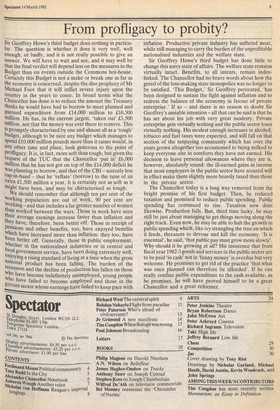From profligacy to probity?
Sir Geoffrey Howe's third budget does nothing in particular. The question is whether it does it very well, well enough, or badly, and it is not really possible to give an answer. We will have to wait and see, and it may well be that the final verdict will depend less on the measures in the Budget than on events outside the Commons hot-house. Certainly this Budget is not a make or break one as far as the economy is concerned, despite the dire prophecy of Mr Michael Foot that it will inflict severe injury upon the country in the years to come. In broad terms what the Chancellor has done is to reduce the amount the Treasury thinks he would have had to borrow to meet planned and guessed expenditure from £14,000 million to £10,500 million. He has, in the current jargon, 'taken out' £3,500 !trillion, not that the money was ever there to remove. This is promptly characterised by one and almost all as a 'tough' budget, although to be sure any budget which manages to Spend £10,000 million pounds more than it raises would, in any other time and place, look generous to the point of Profligacy. It is, in fact, more soft than tough; but given the request of the TUC that the Chancellor 'put in' £6,000 million that he has not got on top of the £14,000 deficit he was planning to borrow, and that of the CBI — scarcely less cap-in-hand — that he 'reflate' (borrow) to the tune of an extra £1,500 million a year, it is certainly not as soft as it might have been, and may be characterised as tough.
We should remember that although ten per cent of the working population are out of work, 90 per cent are working — and that includes a far greater number of women than worked between the wars. Those in work have seen their average earnings increase faster than inflation and they have therefore, been better off. Those in receipt of pensions and other benefits, too, have enjoyed benefits Which have increased more than inflation: they too, have been better off. Generally, those in public employment, Whether in the nationalised industries or in central and local government service, have been doing extremely well, enjoying a rising standard of living at a time when the gross national product has been falling. The burden of the recession and the decline of production has fallen on those Who have become indefinitely unemployed, young people who have failed to become employed and those in the private sector whose earnings have failed to keep pace with
inflation. Productive private industry has suffered most, while still managing to carry the burden of the unprofitable nationalised industries and the welfare state.
Sir Geoffrey Howe's third budget has done little to change this sorry state of affairs. The welfare state remains virtually intact. Benefits, to all intents, remain indexlinked. The Chancellor had no brave words about how the greed of the loss-making state monopolies was no longer to be satisfied. 'This Budget,' Sir Geoffrey perorated, 'has been designed to sustain the fight against inflation and to redress the balance of the economy in favour of private enterprise.' If so — and there is no reason to doubt Sir Geoffrey's amiable intention — all that can be said is that he has set about his job with very great modesty. Private enterprise gets virtually nothing and the public sector loses virtually nothing. His modest enough increases in alcohol, tobacco and fuel taxes were expected, and will fall on that section of the taxpaying community which has over the years grown altogether too accustomed to being milked to keep everyone else in comforts they have not earned. His decision to leave personal allowances where they are is, however, absolutely sound: the ill-earned gains in income that most employees in the public sector have secured will in effect make them slightly more heavily taxed than those in the private sector. The Chancellor today is a long way removed from the bright promise of his first budget. Then, he reduced taxation and promised to reduce public spending. Public spending has continued to rise. Taxation now does likewise. Production falls. But, third time lucky, he may still be just about managing to get things moving along the right track. Even now, he may be able to halt the growth in public spending which, like ivy strangling the tree on which it feeds, threatens to devour and kill the economy. 'It is essential', he said, 'that public pay must grow more slowly'. Why should it be growing at all? His insistence that from fiscal year 1982-3 goods and services in the public sector are to be paid 'in cash' not in 'funny money' is overdue but very welcome. He promises to get rid of the practice 'that what was once planned can therefore be afforded'. If he can really confine public expenditure to the cash available, as he promises, he will have proved himself to be a great Chancellor and a great -reformer.






































 Previous page
Previous page